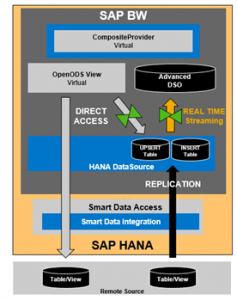Home » Building a Logical Data Warehouse using SAP BW/4HANA Why and How?
Building a Logical Data Warehouse using SAP BW/4HANA Why and How?
By Vvolve
 One of the key building blocks of a SAP Intelligent Enterprise is analytics and decision-making using Intelligent Technologies like Machine Learning, Big Data, Data Intelligence and Predictive Analytics among others. While these technologies are often discussed as the next game-changers for enterprises, what is less discussed, but not less critical, is the underlying data management required to make these Intelligent Technologies happen.
One of the key building blocks of a SAP Intelligent Enterprise is analytics and decision-making using Intelligent Technologies like Machine Learning, Big Data, Data Intelligence and Predictive Analytics among others. While these technologies are often discussed as the next game-changers for enterprises, what is less discussed, but not less critical, is the underlying data management required to make these Intelligent Technologies happen.
Today, I focus on one aspect of data management the use of a Logical Data Warehouse to organize data from different sources, and how this can be implemented using SAP BW/4HANA.
What is Logical Data Warehouse (LDW)?
The term Logical Data Warehouse (LDW) was first used by Mark Beyer of Gartner who is often referred to as the Father of the Logical Data Warehouse. In his blog, Mark proposed the idea of a Logical Data Warehouse as a logical information delivery platform that includes all information in an enterprise.
In general, a LDW is an extension to the traditional data warehouse where an architectural layer sits on top of the usual data warehouse store of persisted data. The logical layer provides several mechanisms for viewing data in the warehouse store and elsewhere across an enterprise without relocating and transforming data ahead of view time.
Data virtualization is a critical part of the LDW architecture enabling queries to be federated across multiple data sources both traditional structured data sources, such as databases, data warehouses, etc., and less traditional data sources, such as Hadoop, NoSQL, Web Services, SaaS applications, and so on while still appearing as a single logical data source to the user.
What are the advantages of Logical Data warehouse?
The advantage of the logical layer is that data is fresher and the structure of delivered data is created at run time without limiting data to the pre-built structures of the data warehouse’s persisted store. Achieving these advantages has been a challenge in the past, because software, hardware, and networks simply lacked the speed, scale, and reliability required of large, complex, ad hoc instantiations. Today, multiple advances have made the logical data warehouse fully practical and feasible for most organizations to implement it.
Building a Logical Data Warehouse using SAP BW/4HANA
With help of SAP Enterprise Information Management (EIM) Smart Data Access component, Open ODS Views and Composite Providers, data virtualization can be achieved in SAP BW/4HANA.

With SAP HANA Source System type, SAP BW can now fully leverage SAP HANA Smart Data Access and Smart Data Integration. This source system enables data provisioning from various data sources. A full list of data sources supported using SAP SDI can be found here. Based on specific requirements, we can further decide whether data has to be persisted in SAP BW or can be accessed virtually from its data source.
Virtualization of data access is, however, only one aspect of LDW. In most scenarios, data from different sources often don’t blend readily and need to be transformed according to business needs before it can provide meaningful insights.
By adding the SAP Agile Data Preparation (ADP) component, another SAP EIM component which comes bundled with SAP BW/4HANA, we should be able to implement a true Logical Data warehouse where all enterprise data can be accessed from one platform.
SAP SP enables users to discover, understand, cleanse, enrich and combine their data. SAP ADP uses HANA SDI to acquire data from multiple sources and create Business Rules to transform raw data and publish it HANA Tables or Calculation Views which can be further used in Open ODS Views and integrate with other data sets for getting complete information.
At vVolve, we have implemented data warehousing, business intelligence and analytics solutions for multiple industries including financial services, oil and gas, aviation, education among others. This has given us a deep knowledge base of business rules and best practices as well as extensive implementation in a wide range of IT system architecture and landscapes, which has translated into faster and more robust implementations and quicker return on investment for our clients.
ARCHIVES
- March 2024 (1)
- January 2024 (1)
- October 2023 (4)
- September 2023 (1)
- June 2023 (3)
- May 2023 (5)
- April 2023 (1)
- August 2021 (1)
- July 2021 (1)
- October 2020 (3)
- February 2020 (1)
- December 2019 (1)
- December 2018 (1)
- October 2018 (1)
- September 2018 (1)
- August 2018 (2)
- July 2018 (2)
- March 2018 (1)
- April 2017 (1)
- October 2016 (1)
- September 2016 (2)
- August 2016 (2)
- July 2016 (2)
- June 2016 (1)
- May 2016 (2)
- April 2016 (2)
- March 2016 (2)
Latest Articles
Harness the Power of Cloud ERP
Companies that are taking advantage of the cloud are the ones leading in their field. Their strategic actions often give them a competitive advantage and help them market share by improving customer experiences.
How vVolve & SAP EWM Can Help Your Warehouse Reach Its Full Potential?
Discover how vVolve with SAP EWM can help address challenges in Warehouse Operations which is an important area in supply chain and which requires extensive cross functional cooperation between purchasing, manufacturing, sales, transportation, workforce management departments.
Discover how Application Management Solutions (AMS) can enhance SAP performance and reliability. Explore proactive monitoring, scalability, cost efficiency, improved security, regular updates, enhanced user experience, and business continuity.
SAP HANA On-Premise Migration: Best Practices and Considerations
Explore the best practices and essential considerations for a seamless SAP HANA on-premise to cloud migration. Learn how to assess your current environment, define clear objectives, plan infrastructure, backup data and ensure version compatibility.





